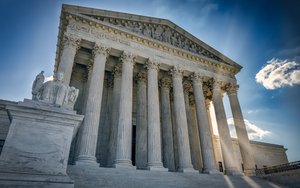
TikTok on Monday told a federal judge it may ask the Supreme
Court to review a lower court decision reviving a lawsuit by the mother of a 10-year-old girl who died after attempting a “blackout challenge” she allegedly saw on the service.
The
lower court ruling, issued by a three-judge panel of the 3rd Circuit Court of Appeals, said Section 230 of the Communications Decency Act doesn't protect TikTok from liability for editorial decisions
about how to display content created by users. Section 230 generally immunizes web companies from liability over material posted by third parties.
On Monday, TikTok asked U.S. District Court
Judge Paul Diamond in the Eastern District of Pennsylvania to temporarily halt proceedings until at least January 21 -- the company's deadline for seeking Supreme Court review.
While TikTok
said it hasn't yet decided whether to ask the Supreme Court to intervene, the company also said the case was an “obvious candidate” for review, noting that other appellate judges have
ruled that Section 230 immunizes companies from liability for recommendations. The company specifically noted that the 2nd Circuit Court of Appeals ruled in 2019 that Section 230 protected Meta from a lawsuit alleging that its
algorithmic recommendations helped fuel terrorism.
advertisement
advertisement
“The Supreme Court is therefore likely to grant [review] in the event that TikTok decides to seek it,” the company wrote.
“It therefore makes little sense to proceed with this case until TikTok decides whether to seek Supreme Court review and the Supreme Court decides whether to accept a petition if
filed.”
The company's request comes in a lawsuit by Tawainna Anderson, mother of Nylah Anderson who died in December 2021 after attempting the “blackout challenge.” That
challenge, which was then circulating on TikTok, showed people strangling themselves.
Tawainna Anderson raised several claims in her 2022 complaint against TikTok, including that its service
is “dangerously defective” due to its algorithm.
Diamond initially dismissed the suit, ruling that TikTok was protected by Section 230. He said in a written opinion that
Anderson's claims about TikTok were “inextricably linked” to its role as a publisher of content created by users.
Anderson then appealed to the 3rd Circuit, which revived the case
in an opinion written by Circuit Judge Patty Shwartz and joined by Peter Phipps. Circuit Judge Paul Matey partially concurred in a separate opinion.
Shwartz wrote that TikTok's
algorithmic curation of users' speech is TikTok's own “expressive activity,” and therefore not protected by Section 230.
Some industry observers and legal experts said at the time that the ruling effectively guts Section 230 in the 3rd
Circuit, which covers Pennsylvania, Delaware and New Jersey.
TikTok -- backed by numerous outside groups, including the Interactive Advertising Bureau -- then asked the 3rd Circuit to
reconsider that ruling. The IAB and others argued in a friend-of-the-court brief that the decision “destabilizes established law in ways that threaten profound consequences for countless
websites across the Internet --and their users.”
Last month, the 3rd Circuit rejected the request for reconsideration, setting up TikTok's possible appeal to the Supreme Court.
Andersen's lawyer objected to TikTok's request for a stay, calling it a “stall tactic.”
“TikTok’s petition for a writ of certiorari has not been filed, and TikTok
won’t even commit to whether it will be,” counsel wrote. The attorney added that a stay would be appropriate if the Supreme Court ultimately agrees to hear the case.